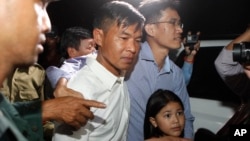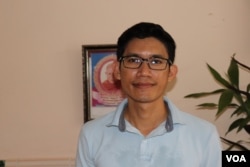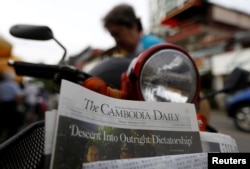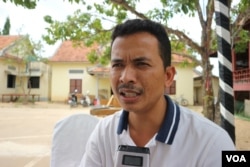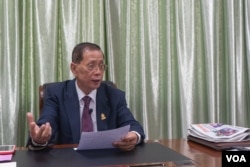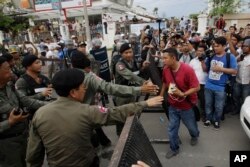The heat was unbearable.
Even now, on the outside, Cambodian journalist Yeang Sothearin is reminded of it every time the temperature rises: the stifling overcrowded cell at Prey Sar prison, where he and fellow former Radio Free Asia journalist Uon Chhin spent almost 10 months of their lives.
“I was sucked physically and mentally and separated from my family,” Sothearin, 36, recalled in a recent interview in Phnom Penh. “My wife was not with me, and my children did not have their father with them. It is a painful experience since the beginning.”
Sothearin and Chhin were initially detained in November 2017 on accusations they set up a karaoke parlor without permission. Then they were charged with “sending information to a foreign government" but eventually released in August 2018.
Their incarceration, however, was widely viewed as part of a state-backed crackdown against independent media and opponents before the country’s 2018 national election, in which the ruling Cambodian People’s Party won all seats after dissolving the main opposition party.
Now, nearly a year since the ballot, the wave of oppression may have subsided, but the damage to the country’s democratic structures is clearly visible.
This is particularly the case with Cambodia’s once vibrant independent media. Radio stations have been shut down and the English-language newspaper The Cambodia Daily was slapped with a tax bill of more than $6 million, forcing it to close.
Two of its former reporters, charged with “inciting a crime” for asking questions about voting habits, have left the country.
One of them, veteran Cambodian journalist Aun Pheap, 55, sought asylum in the U.S.
A large tax bill was also delivered to the Daily’s crosstown rival, The Phnom Penh Post, which was then sold to a Malaysian publisher with links to the government.
With International Press Freedom Day marked May 3, journalists in Cambodia spoke to VOA about working in an environment of intimidation, harassment, and fear of arrest. Self-censorship has become more common, they say.
For Sothearin, it feels like being haunted. While he was released on bail last August after the election, the charge still dangles above his head. According to Sothearin’s lawyer Sam Chamroeun the prosecutor’s investigation has finished and the case has been handed to the judge.
However, no date for a trial has been set and no evidence to support the charges has emerged. Court officials declined to discuss the case.
In the meantime, Sothearin’s passport has been confiscated, meaning he’s unable to travel to his parents in Vietnam’s south, and he’s required to report to the court once a month.
“My children are worried about me. ‘[They asked me] father, when could we go to our homeland? When will the court drop the charge against you? Will the court put you in jail again?’” Sothearin said.
After six years of reporting, he’s also lost his job after RFA shut down its local operation amid the crackdown.
Southeast Asian Press Alliance (SEAPA) executive director Tess Bacalla said the arrest of Sothearin and his colleague has had “a chilling effect on Cambodian journalists."
“Even if these reporters were freed eventually, on pain of being sent back to prison anytime, there was no mistaking the clear signal, or warning, it sent to the media: Don't overstep your bounds. Or put simply, don't publish critical reports that put the government in a bad light lest you suffer the same dire consequences, or worse, as others that have found themselves in government's cross-hairs,” Tess Bacalla told VOA via email.
Nop Vy, media director of the Cambodian Center for Independent Media (CCIM), which runs VOD, said that the attacks on media make journalists think twice about what they write.
“Censorship exists amongst our journalists,” she said. “Some stories are even hard to get published because of the difficulty in getting information from relevant institutions. Other cases it's because of sensitivity and the in-depth nature of the story that affect some high ranking officers.”
“In short, the journalists more or less fear because they have seen the situation in the country, the arrests, lawsuits, and accusations.”
The former RFA pair aren’t the only ones to find themselves behind bars. Last December, fixer and translator Rath Rott Mony was arrested for a report on child sex trafficking that he helped Russian media to cover.
Yon Sineat, 34, a former reporter for Phnom Penh post, says the cases weigh on her mind when doing journalism in Cambodia.
Sineat said she left the Post because she wants to maintain her independence and neutrality in her reporting news.
She now works as a freelance journalist and as a fixer for foreign reporters.
“Sometimes I have to decline because I do not want charges against me because of the story,” she said.
She explained she’d avoided a documentary project for fears it could lead to trouble.
“The story was about surrogacy, so I think it could affect [people]. The media that contacted me wanted to show the faces of the women who surrogate. Some people think they are victims, but the most important thing is showing their identities and their faces,” she said.
“I think if we did that story, first it could embarrass them especially in their community because the community would see their faces and know them,” she said. “Second, the authority could take action, filing a complaint against me accusing me of spreading misinformation or labeling the women; that’s why I rejected it.”
Chhorn Chansy, 36, started his job with Cambodia Daily in 2007. He worked hard from a reporter to an assignment editor with the Daily.
Chansy said that not only are journalists taking precautions in picking their subjects, but sources also are alarmed.
“When this [arrest] happened our sources have been very careful to talk to us. If they say something that could affect someone, they could face the law as well, so it’s hard for us to get information,” he said.
In its annual report released this month, Reporters Without Borders (RSF) ranked Cambodia 143 out of 180 countries for press freedom, dropping it yet another place.
The negative trend was apparent in the region. Myanmar, which in 2017 imprisoned two Reuters reporters for violating the British colonial-era Official Secrets Act after their investigation into a massacre of Rohingya Muslims in Rakhine state, dropped to 138.
The Philippines, where CEO and executive editor of news website Rappler Maria Ressa was charged with “cyber libel” in February for a 2012 report about a Filipino businessman, dropped 134.
Sineat said the lack of positive examples in the region was worrying for Cambodia.
“We do not have neighboring countries that are open to journalists that could be our media role model and that could reflect [our work], so our government thinks that they give us enough freedom [to work compare to other countries],” Sineat told VOA in a video interview.
Cambodian officials dispute reports showing declining press freedom.
“They analyze [the press] hundred of thousand kilometers away. [Their report] can’t be accepted,” said Sok Eysan, Cambodian People’s Party (CPP) spokesman.
Arguing that the country’s media environment is in a “healthy state” Eysan cited the number of outlets.
“Now let’s think about this; we have 650 media institutions. The data is from the ministry of information. There are 411 newspapers in Khmer Language and 25 newspapers in foreign languages. We have 194 magazines and 20 bulletins, 41 journalist clubs, 220 radio stations in a very small country like Cambodia.”
Asked about the fate of critical journalism, Eysan claimed many of the remaining outlets “spoke the truth” in their seemingly pro-government line.
“We can’t say that hundreds of newspaper institutions are pro-government. They speak the truth. They praise the government and people also praise the government about development.”
In an apparent sign of discrimination, reporters from the Cambodia Daily, VOD and VOA have complained that the government has denied them press passes.
Club of Cambodian Journalists head Pen Bona, whose organization is viewed as government-aligned and also editor-in-chief of TV station PNN, which is owned by business tycoon and ruling party Senator Ly Yong Phat, acknowledged that some outlets were regarded as “illegitimate” by authorities but suggested it was up to reporters to “comply with the law."
Nonetheless, Bona said that all journalists should be treated equally.
“I would like to request to the relevant authorities to open up to all journalists,” Bona said.
The government’s crackdown hasn’t just drawn condemnation from journalists and rights groups.
The European Union in February started the process that could lead to the temporary suspension of Cambodia's preferential access to the EU market under the Everything But Arms (EBA) trade scheme.
The process was started with the EU’s concerns about “severe deficiencies” in the country’s respect for human rights, including freedom of expression.
EU ambassador to Cambodia George Edgar told VOA a free media was “an important underpinning of pluralist democracy."
“The EU raised on a number of occasions its concern over the extended pre-trial detention of the two former Radio Free Asia reporters. While their release on bail in August 2018 was a welcome development, they still face serious criminal charges,” he said.
“As in any other case, we expect the Cambodian authorities to provide for a fair trial without undue delay if there is evidence that a crime has been committed.”
Whether the EU will take action or not remains to be seen.
While rights groups continue to pressure for the charges against him to be dropped, Sothearin said he still held out hope things will go well.
Still, he says he’s determined to one day return to journalism, which he says is “crucial” for Cambodia’s future.
“I still love the journalism profession. One day if [the government] allows us to [operate] as before, I’ll go back," he said.
“I write stories, so people could read and know about social issues,” he said. “As a journalist, I only write the truth. If I don’t do that I will have trouble."




